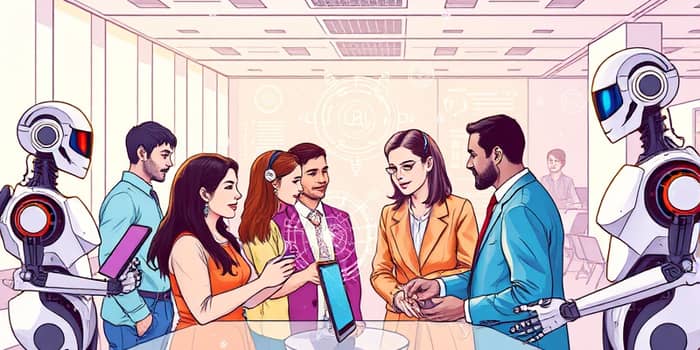
The world of work is undergoing a profound transformation. As we navigate an era defined by rapid technological change is constant, leaders and employees alike must adapt strategies that balance innovation with human purpose. From AI-driven automation to evolving workforce demographics, the future demands a mindset that embraces change, fosters creativity, and cultivates resilience. This article explores the key trends shaping tomorrow’s workplace and offers actionable insights to inspire organizations and individuals to thrive.
Grounded in the latest research and data, we’ll examine how artificial intelligence, lifelong learning, equitable hiring, and human-centric leadership converge to create a dynamic economy. By understanding these forces, decision-makers can build future-ready teams, fuel sustainable growth, and honor the potential of every contributor in an increasingly interconnected world.
Artificial intelligence and automation stand at the forefront of workplace innovation. According to industry surveys, 60% of employers believe AI augments rather than replaces existing roles, enabling teams to focus on creative, strategic, and interpersonal responsibilities. Yet only 19% of organizations have successfully scaled their AI initiatives, highlighting a critical opportunity for competitive differentiation.
By 2030, estimates indicate that 30% of routine work activities could be automated, requiring a shift toward hybrid roles that blend technical fluency with human intuition. More than 80% of workers using generative AI expect improved efficiency, and nearly half anticipate higher compensation as a result. To harness these gains, companies must build infrastructure that aligns AI integration with employee experience and ethical governance.
As new technologies emerge, existing skill sets risk obsolescence. Research projects that 39% of today’s abilities will be transformed or outdated by 2030, while 59% of the workforce will require upskilling or reskilling. Unfortunately, 11% may not receive adequate training, jeopardizing their career prospects.
To address these gaps, organizations are prioritizing learning initiatives. reskilling and supporting people’s growth must become central to talent strategies. Executives report that soft skills—communication, collaboration, empathy—are as vital as technical capabilities, with 92% emphasizing their importance. Effective mentorship, personalized coaching, and immersive learning experiences sustain continuous development.
Leadership in the dynamic economy demands fresh roles and mindsets. New C-suite positions dedicated to digital fluency, AI governance, ethics, and sustainability are emerging. CEOs must inspire a multigenerational workforce—spanning Baby Boomers to Gen Z—while collaborating with AI as a decision-making partner.
Agility and adaptability are no longer optional. Organizations need resilience against disruptive challenges through fluid development ecosystems and integrated feedback loops. Building a strong corporate “immune system” involves decentralized decision-making, cross-functional teams, and transparent communication channels that foster trust and innovation.
Traditional credentials are giving way to competency-focused recruitment. Today, 63% of organizations adopt skills-based models, widening talent pipelines and reducing bias. Tools such as anonymous resumes, practical assessments, and AI-powered bias detection help ensure fairness and inclusivity.
Furthermore, companies are tailoring work arrangements to individual needs, using analytics to deliver personalized employee experiences and wellness. Flexibility in schedules, roles, and career paths enhances engagement and retention, particularly among underrepresented groups.
The net effect of automation and AI is striking. By 2030, structural transformation is expected to create 170 million new jobs while displacing 92 million, yielding a net gain of 78 million positions—a 7% increase in employment. In parallel, 52% of employers plan to allocate a larger share of revenue to wages as competition for talent heats up.
During periods of inflation or economic downturn, resilience, flexibility, and creative thinking become even more valuable. Leaders who invest in human creativity, problem-solving, and empathy will unlock novel solutions and drive sustained performance.
Employee mental health is critical. With mental health concerns costing the global economy $1 trillion annually in lost productivity, 70% of companies are boosting investments in well-being and flexibility. AI-driven analytics enable personalized employee experiences and wellness, offering tailored support and early intervention.
Data privacy, AI governance, and ESG considerations also shape organizational trust. Balancing workplace surveillance with individual privacy safeguards, and embedding ethical frameworks around technology, are essential for building reputation and loyalty. Simultaneously, climate-change mitigation becomes a core strategic priority, as sustainability drives long-term resilience.
As technology reshapes work, the most successful organizations will be those that harmonize innovation with human purpose. By fostering skills-based hiring becomes standard practice, cultivating continuous learning, and championing well-being, leaders can unlock collective potential and future-proof their operations.
The journey ahead calls for bold vision and compassionate stewardship. Embrace change, invest in people, and uphold ethical imperatives. Together, we can build a dynamic economy where technology amplifies human strengths, creativity fuels prosperity, and every individual thrives in the evolving world of work.
References





